- Home
- Donald Hamilton
The Ambushers mh-6
The Ambushers mh-6 Read online
The Ambushers
( Matt Helm - 6 )
Donald Hamilton
The top-ranking American Secret Agent rides again with good writing, slick plotting and stimulating characters. "All tartly flavored with wit," says Book Week. Another in the classic Matt Helm series. Rated R for violence.
Donald Hamilton
The Ambushers
I
THE NATIVES CALL IT the River of Goats, the Rio de las Cabras. In the time I was there I saw no goats, but that means nothing. I wasn't hunting goats, I was hunting a man. Anyway, we only ran up the stream a few miles, until the jungle started closing in on either side, overhanging the water blackly.
Then the Navy coxswain, who seemed to know where he was in spite of the darkness, put the junior-grade landing craft, if that's what you call it, in to the bank, and that was as far as I got to travel sitting down. I had the gun case between my knees so it wouldn't get knocked around or stepped on. The little pack, less sensitive, was down on the floorboards somewhere. I rose, kicked around, found it, struggled into it, and slung the long, heavy plastic case over my shoulder by its strap. I stepped ashore in the dark, hoping there wouldn't be any snakes or alligators to greet me.
Somebody said, "Good luck, sir. We'll be back the day after tomorrow."
The ugly little boat backed off silently-they've done some good work on mufflers since World War Il-and turned sharply and hissed and burbled away into the night, heading for open water and the ship waiting offshore. There'd be coffee ready when they got aboard, I reflected. There's always coffee when you're with the Navy, but I wasn't with the Navy any longer.
There was nothing for me to do but stand and wait, so I stood and waited. I couldn't help thinking that there was a certain resemblance in names between the River of Goats, here in Costa Verde-well, let's call it Costa Verde-and the Bay of Pigs over in Cuba, where some other men had been put ashore not too long ago under somewhat similar circumstances. They'd been trying to start a revolution and I was supposed to stop one, but the basic situation was about the same. I couldn't help remembering that they hadn't had much luck at the Bay of Pigs.
Something rustled in the jungle behind me, but I didn't turn. I stood quite still on the river bank, letting whoever was there see me motionless against the dully gleaming water, with my hands empty. I didn't know how nervous he'd be.
"Senor Hernandez?" It was a soft whisper.
"I'm Miguel Hernandez," I said.
This was a lie. The blood of the Conquistadores does not flow in my veins. I was born in Minnesota, and while I moved to the state of New Mexico at an early age, and picked up a little Spanish there, I still get along better in some Nordic tongues, not to mention English. However, for this occasion, I'd had my face and hands stained and my hair dyed. I wasn't supposed to have to fool anybody up close. On the other hand, it was considered inadvisable to advertise too widely the fact that I was a foreigner. Besides, a dark face shows up less conspicuously in the forest.
"This way, senor," said the voice. "Follow me, POT favor."
I turned deliberately and moved towards the sound. I saw a dim shape in the brush. There was a big hat and some more or less white clothing. The man moved off silently, and I followed the gleam of dirty white through the blackness, tripping over vines and getting the gun case 'hung up in tangled branches. Some people can take their jungles or leave them alone. I prefer to leave them, but I hadn't been asked.
We came into a clearing where a small fire burned. There were a lot of ragged, tough-looking, dark-faced men-about twenty, I judged-and a couple of ragged, full-bodied, dark-faced women dressed pretty much like the men, but you could tell the difference. I wondered briefly about the women; I hadn't expected any. I decided they'd been brought to make this bandit-looking crew look authentic. There were also a lot of firearms being treated in a very casual manner, including some nasty-looking little automatic weapons that caught the red of the firelight.
It used to be that a pelado with a machete was considered well-equipped, and if he had a rifle he was a great man. Now he's but nothing unless he's got a machine pistol that'll rip them off at the rate of several hundred rounds per minute. Well, the Latin temperament has never lent itself to careful, one-shot marksmanship. That's why I was there.
Of course, these weren't pelados. They had a trained, un-peasantlike look, and despite the presence of women, despite the nondescript clothes and casual manner, you could detect a military air about the encampment. My guide led me past the fire to where a man was sitting in a folding camp chair, smoking a cigar. He was a small, swarthy, mustached man in a big straw hat and soiled khakis. He needed a shave, and he was the type that misses the razor badly. Still, in some indefinable way, he managed to look quite jaunty and dapper in the flickering light. Perhaps it was the angle of the cigar that did it.
He was wearing a.45 automatic at his hip, in a military holster with a snap-down flap. If he'd locked it in his safe at headquarters, back in the capital city of Costa Verde.- the saintly name of which escapes me momentarily-the weapon might have been a little harder to get at, but not much.
"The boat came, ml coronel," said my guide. "Here is the man."
The occupant of the chair dismissed him with a wave of the hand, watching me.
"You call yourself Hernandez?"
He hadn't risen to greet me, he didn't remove the cigar to talk, and his voice was curt. So it was going to be that kind of a job. I felt a surge of sympathy for the military gent, whoever he was, who said that he could deal with his enemies, but God would have to protect him from his allies.
"Who asks?" I demanded.
"I am Colonel Hector Jiminez." He pronounced it Himayness, Spanish fashion, with the accent on the second syllable.
"Then if you are Jiminez, I call myself Hernandez," I said.
"What is your true name?"
This wasn't really a state secret. The cover was primarily for his benefit, not mine. If he wanted me to break it, that was his business. It was his country and he'd have to live in it afterward. I wouldn't. Assuming, of course, that both of us survived the mission.
"My name is Helm," I said. "Matthew Helm."
He took the cigar out at last, looked at it, and threw it aside. He looked me up and down carefully.
"All this," he said, gesturing towards the fire and the group around it, "all this for just one man. All this merely to assist one long, clever gringo with a gun. Is that the gun?"
"Yes," I said. It didn't seem like the proper time to resent being called gringo.
"Show it to me."
"You'll see it when the time comes, Colonel," I said. "Not now."
His eyes narrowed. "It was an order, Senor Helm."
"And it was refused. With all due respect," I said. "The gun was prepared in a climate much dryer than this. It was enclosed in an airtight case with silica gel to maintain it at the proper humidity. To show it now would be to expose it to moisture prematurely."
He stared at me hard for almost a minute. Then he dropped his hand abruptly to the holster at his hip. If he wanted to get rough, I didn't have a chance, but I couldn't help putting my left hand-the right was grasping the rifle-case strap-on the butt of the little.38 on my belt, ready to twist it out of its trick spring holster. I guess I could have sold my life dearly, as the saying goes, but it wasn't exactly what I'd been sent there for.
Jiminez glanced at my hand, smiled faintly, and undid the flap of his big military holster with careful deliberation. He pulled out a fresh cigar. From another compartment inside the holster, he produced a tool with which to trim it and a lighter with which to light it. Then he returned the instruments to the holster and buttoned the flap down neatly.
"If I had been abl
e to shoot as a junior officer," he said, blowing smoke at the nearby trees, "I would be a general now, Senor Helm. It is a great handicap to a military career, being a poor marksman. Since I cannot shoot, why should I burden myself with a big pistol?" He smiled a little. "Besides, if one has the firearms, one can always find men to use them. And even if one does not have them, generous friends will often supply them." He looked at the gun case significantly.
I drew a long breath. "I will open the case if you repeat the order, Colonel. But afterward I won't guarantee the results."
He nodded. "Very well. Get some sleep. It is not very practical to travel the jungle at night. In the morning we move."
"Yes, sir," I said, and started to turn away.
"Senor Helm."
I looked back. "Yes?"
"This silica of which you speak," he said curiously. "What is it?"
"It's a desiccant," I said. "Silica gel. It takes moisture out of the air. When it has absorbed all it can hold, you have to heat it in an oven to restore its efficiency. But we're not apt to be here long enough to make this necessary."
"No. We should reach the village of El Fuerte by tomorrow afternoon." He took the new cigar from his mouth and regarded it thoughtfully. "Silica gel. The wonders of North American science applied to the problems of Central American rebellion. Good night, Senor Helm."
II
FUERTE MEANS STRONG in Spanish, and it would make an interesting project for some statistically minded graduate student to determine just how many lawless gents have come out of those monkey-and-orchid jungles calling themselves El Fuerte, The Strong One. This particular contender for the strong-man title of Costa Verde was named Jorge Santos, pronounced Horgay. He was apparently doing well enough in a military way to worry the government of the country, not to mention some people in Washington.
"He's already got about a quarter of the country under his control," Mac had told me, briefing me on the assignment in his second-floor office in a shabby old building that isn't pointed out to visitors taking the standard rubberneck tour of the nation's capital. "Except for a few coastal plantations, it's the quarter nobody wants, but still it's real estate, and General Santos rules it in the name of the revolution. President Avila has asked the United States for help. For one reason and another, military intervention isn't feasible right now. We've been asked to do what we can." I said, "Avila? Haven't I read something about President Avila of Costa Verde?"
"Probably," Mac said. The bright window behind him highlighted his clipped gray hair, but made his expression hard to read. "He is not the nicest friend we have down there. But his morals aren't the concern of this department, Eric, nor is the character of his government."
It was an official rebuke, emphasized by his use of my code name. He was reminding me that this wasn't the bureau of bleeding hearts. That was over in the State Department somewhere.
"No, sir," I said.
"The fact is, this Santos gentleman with the boastful nickname seems to have grown himself a beard like Castro and acquired the same kind of friends. The Fidelista movement seems to be quite contagious. Your contact will be a colonel in the Federal army named Jiminez. He'll arrange to get you in and out."
"Cheerfully?" I asked.
"Well," said Mac dryly, "they were apparently hoping for a couple of divisions of Marines. They may be a trifle disappointed. Furthermore, we have already made one attempt that failed. This will complicate your mission in several ways…"
I thought of these complications now, lying with my eyes closed at the side of the jungle clearing. It was going to be a pleasant assignment, I reflected, with my target alerted and my allies disappointed and disillusioned, having already seen the job loused up once by an Americano miracle worker sent to take the place of the troops they'd requested. You could hardly blame Colonel Jimnez for being, let's say, a trifle reserved in his greeting.
It was getting towards morning, and the camp was starting to come awake after some hours of quiet, but I saw no reason to jump up and start functioning. There was nothing for me to do, and somebody might think I was too jittery to sleep. I lay there breathing evenly with my arm through the sling of the rifle case, until a man came to wake me and tell me that there was food by the fire and the colonel wished to inform me that we would march in ten minutes.
South of the Rio Grande-and we were a long way south-ten minutes usually means half an hour, but apparently our diminutive C.O. wasn't one of the standard mauiana boys. In ten minutes we were on the trail, if you could call it that, with daylight showing gray through the tangled jungle. In fifteen minutes I was sweating copiously, although the heat of the day was still to come. The little man set a fast pace. I was in fair condition, but it wasn't my kind of country, and the pathfinders out ahead were picking holes for people their own size. Long~legged gringos six feet four could damn well look out for themselves.
I stuck behind Jimnez, near the head of the column. He never looked back. His faded shirt remained dry across the shoulders. Behind me came the men who weren't swinging machetes out front, and the two women. I heard good-natured grumbling in Spanish and deciphered some of it. It was all very well for their coronelcito to amuse himself by running the legs off the tail Americano, they were saying, but he should take some thought to his own people, who had marched hard yesterday and the day before. It was not a joke worth killing oneself for.
if their little colonel heard them, you couldn't tell it from his stride. He kept us as close to a lope as conditions permitted, with only an occasional pause for breath and food, and brought us to the outskirts of the village about five in the afternoon, after circling wide to make the final approach from inland.
At last I was told that our destination was just over the ridge when we finally came to a halt in a wooded ravine. We'd climbed all day, and this was a different, higher, and dryer kind of forest from the jungle in which we'd started, but it still wasn't likely to be mistaken for the arid New Mexico country I'd hunted as a boy. The ravine was apparently a prearranged rendezvous. A man was awaiting us among the trees, a barefoot peasant type in dirty white pajamas and a big hat. Jiminez spoke to him briefly in Spanish that was so different from my border lingo that I couldn't really follow it. I gathered only that the man came from the village, and that the situation there was favorable in some respects, unfavorable in others.
The man slipped away. Jiminez got the two women and three of the men off to one side and gave them instructions I couldn't hear. The older of the women carried a machine pistol in a negligent manner. The younger packed a rifle as if she knew what it was for. In pants, both looked as tough as their male companions or tougher. I wondered where all the gentle, shy, beautiful little Latin heroines were hiding, the ones 'Who share the hero's bed, or bedroll, in every jungle epic ever written or filmed. Then I wondered what the hell I'd do with one if I had her. I wasn't exactly in the mood. I sat down on a log and rubbed my right thigh, from Which a bullet had been extracted some months before.
"You have trouble with the leg, Senor Helm?" Jiminez asked, coming up to seat himself beside me.
"No trouble," I said. I couldn't have him thinking he had a cripple on his hands, on top of everything else, so I lied a little. "An old injury. It just stiffens up sometimes."
The mixed quintet, male and female, was moving off up the ravine. The older woman seemed to be in command. I assumed they'd been assigned to deal with one of the complications Mac had told me about. Jiminez caught the direction of my look and confirmed my thought.
"They will do what they can when the shooting starts," he said. "I do not have very great hopes for their success, however. There are at least two hundred men in the village, I have just been told. A few of those are paid by us, of course, but they cannot help openly or their usefulness is at an end."
"We're supposed to give it a try," I said. "But it's a secondary objective and they're your people. How hard you want them to try, under the circumstances, is for you to say. Is our primary objective
at home?"
"Yes. I am told that he is expecting visitors by road before nightfall. We can hope that they will arrive before the light fails, and that he will come out of his hut to greet them. The entrance faces this way, as you will see when you get up there." He inclined his head towards the top of the ridge.
"Sure." I slid the pack off my back and got out the ten-power binoculars I'd brought along. "Will you assist me, Colonel, or can you assign me a man who speaks some English?"
"I will assist you personally."
It was good in some ways, bad in others. "It is understood," I said carefully, "that if I make requests or give instructions, I mean no disrespect for your rank."
He gave me his thin smile. He was a good-looking little man; he must have been a pretty boy. I didn't let that influence my judgement. Some of the meanest, switchblade packing pachucos I'd known back home were real handsome kids.
He said, "It is understood."
"Then I want you to take these glasses," I said. "I want you to be watching through them when I fire. If I miss, you must tell me where it goes so I can correct the next shot properly."
"There will not be time for many shots," Jiminez said.
His expression didn't change, but it was clear nevertheless that he didn't like my talking about misses. One American agent had already missed.
I said, "If there's time for one, there's generally time for two. If I miss, look for the dust where it hits and give me the distance I'm off. In meters or fractions of a meter if you like. Give me the direction by the clock. Twelve o'clock, three o'clock, six o'clock, nine o'clock, or points between. You understand?"
"Si. I have shot at the targets, senor, if without much success. I understand. Just a moment."
He rose and spoke softly to a man standing by, who seemed to be a non-commissioned officer of some kind. The NCO went over to a group of others and spoke to them, pointing to the ridge. They all started scrambling upward, fanning out. Jiminez returned and sat down again.

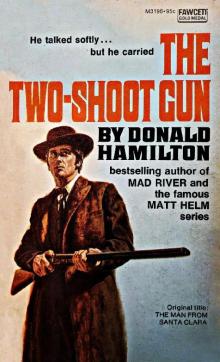 The Two-Shoot Gun
The Two-Shoot Gun Mad River
Mad River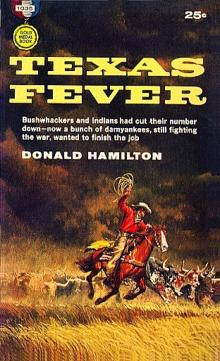 Texas Fever
Texas Fever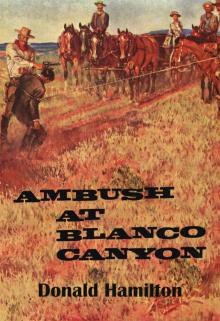 Ambush at Blanco Canyon
Ambush at Blanco Canyon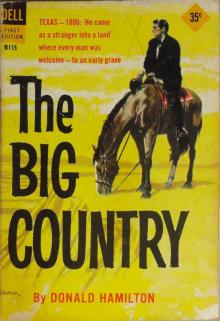 The Big Country
The Big Country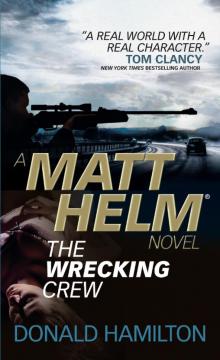 The Wrecking Crew
The Wrecking Crew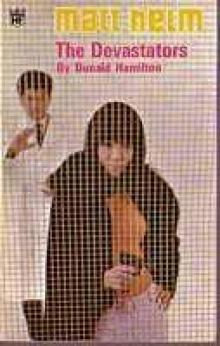 The Devastators mh-9
The Devastators mh-9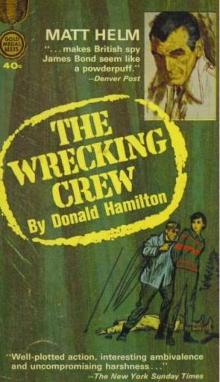 The Wrecking Crew mh-2
The Wrecking Crew mh-2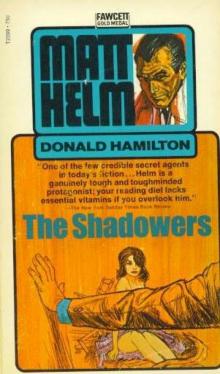 The Shadowers mh-7
The Shadowers mh-7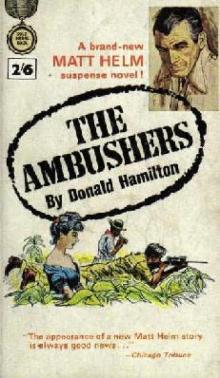 The Ambushers mh-6
The Ambushers mh-6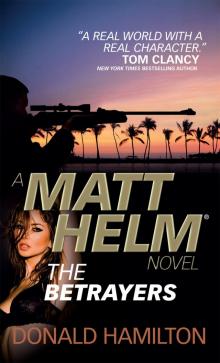 The Betrayers
The Betrayers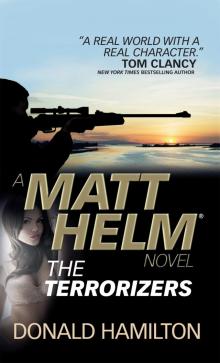 The Terrorizers
The Terrorizers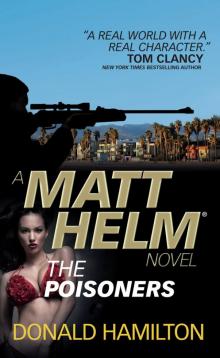 The Poisoners
The Poisoners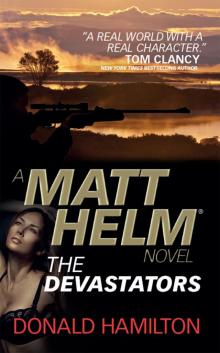 The Devastators
The Devastators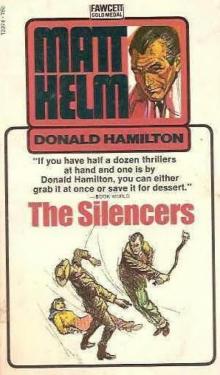 The Silencers mh-5
The Silencers mh-5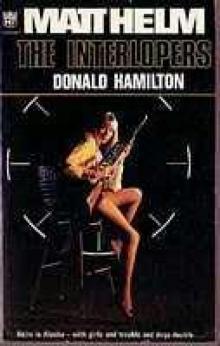 The Interlopers mh-12
The Interlopers mh-12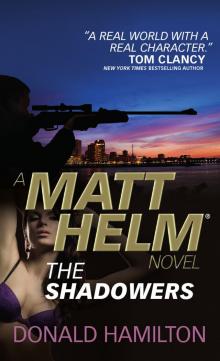 The Shadowers
The Shadowers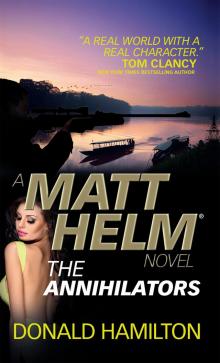 The Annihilators
The Annihilators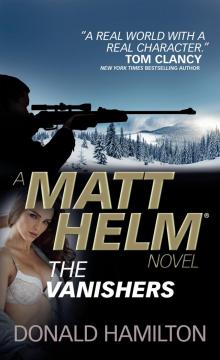 The Vanishers
The Vanishers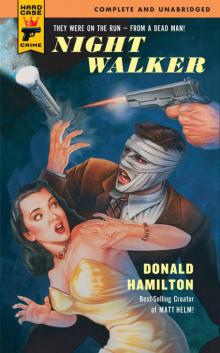 Night Walker
Night Walker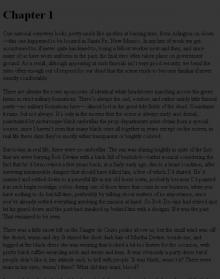 The Revengers
The Revengers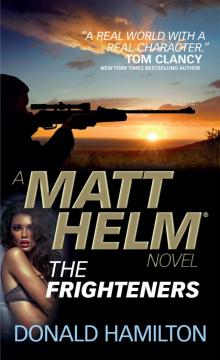 The Frighteners
The Frighteners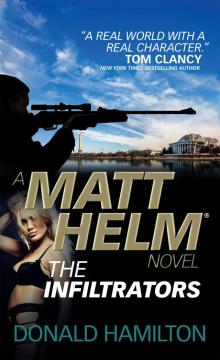 The Infiltrators
The Infiltrators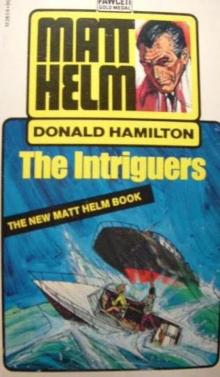 The Intriguers mh-14
The Intriguers mh-14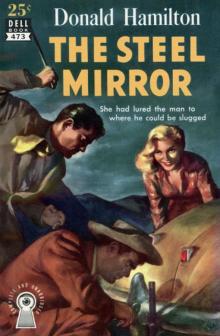 The Steel Mirror
The Steel Mirror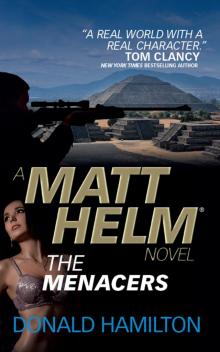 The Menacers
The Menacers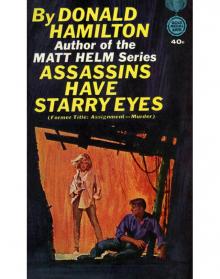 Assassins Have Starry Eyes
Assassins Have Starry Eyes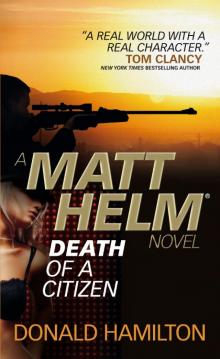 Death of a Citizen
Death of a Citizen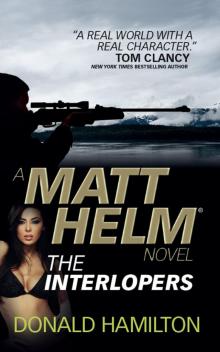 Matt Helm--The Interlopers
Matt Helm--The Interlopers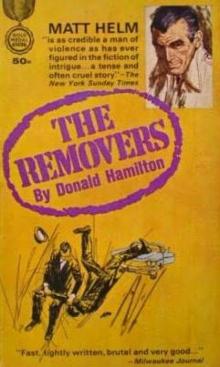 The Removers mh-3
The Removers mh-3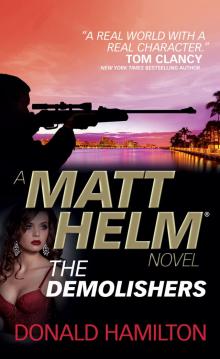 The Demolishers
The Demolishers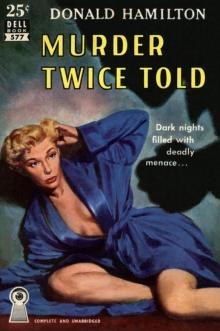 Murder Twice Told
Murder Twice Told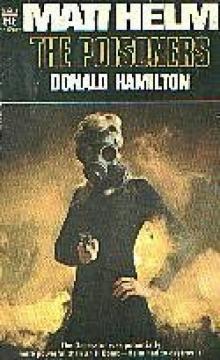 The Poisoners mh-13
The Poisoners mh-13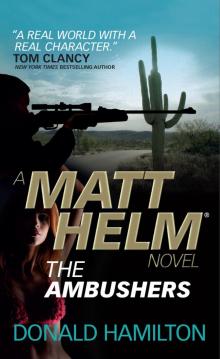 The Ambushers
The Ambushers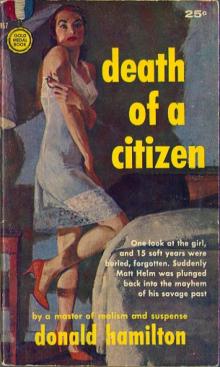 Death of a Citizen mh-1
Death of a Citizen mh-1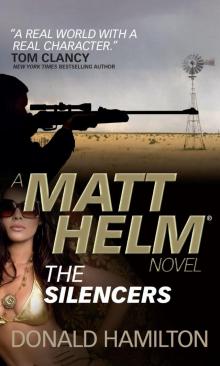 The Silencers
The Silencers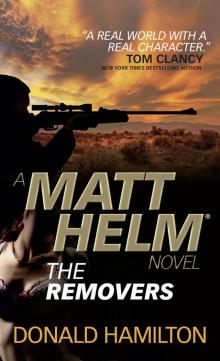 The Removers
The Removers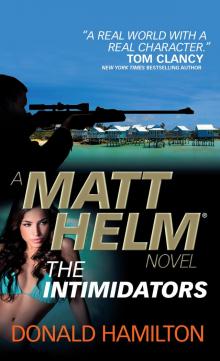 The Intimidators
The Intimidators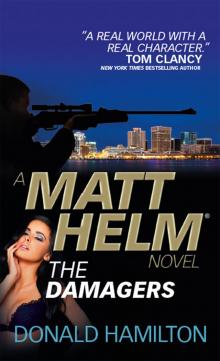 The Damagers
The Damagers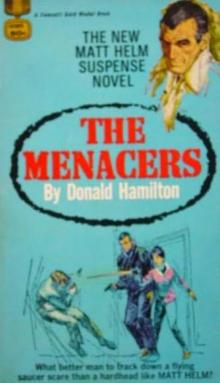 The Menacers mh-11
The Menacers mh-11 The Retaliators
The Retaliators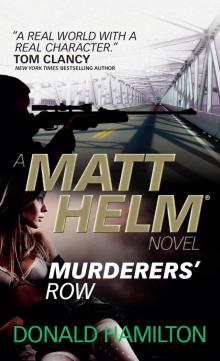 Murderers' Row
Murderers' Row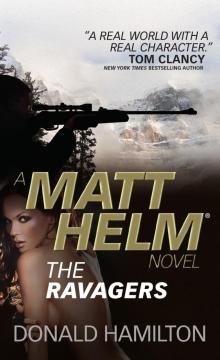 The Ravagers
The Ravagers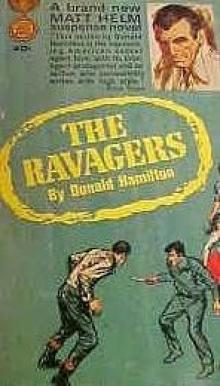 The Ravagers mh-8
The Ravagers mh-8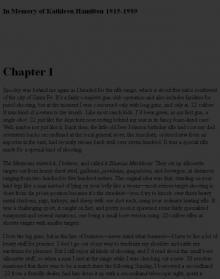 The Threateners
The Threateners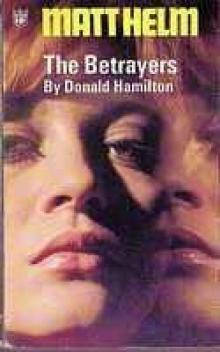 The Betrayers mh-10
The Betrayers mh-10